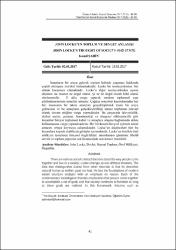| dc.contributor.author | Şahin, Kamil | |
| dc.date.accessioned | 2021-01-14T18:19:48Z | |
| dc.date.available | 2021-01-14T18:19:48Z | |
| dc.date.issued | 2017 | |
| dc.identifier.issn | 2148-1237 | |
| dc.identifier.issn | 2587-0114 | |
| dc.identifier.uri | https://app.trdizin.gov.tr/makale/TWpZd05qTTJOZz09 | |
| dc.identifier.uri | https://hdl.handle.net/20.500.12587/13845 | |
| dc.description.abstract | İnsanların bir araya gelerek toplum halinde yaşaması hakkında çeşitli sözleşme teorileri bulunmaktadır. Locke bu teorisyenlerden biri olarak karşımıza çıkmaktadır. Locke'u diğer teorisyenlerden ayıran düşünce ise insanın ne doğal olarak iyi ne de doğal olarak kötü olarak nitelemesidir. O akla vurgu yaparak modern toplumsal yapı çözümlemelerinin temelini atmıştır. Çağdaş sosyoloji kuramlarından her biri insanların bir takım amaçları gerçekleştirmek üzere bir araya gelmesine ve bu amaçların gerçekleştirildiği sürece toplumun işlevsel olarak devam ettiğine vurgu yapmaktadır. Bu çerçevede işlevselcilik, akılsal seçim, çatışma, fenomenoloji ve simgesel etkileşimcilik gibi kuramlar bireyin toplumsal kabul ve amaçlara ulaşma bağlamında aklını kullanmasına vurgu yapmaktadırlar. Her bir kuram bireysel eylemin temel amacını ortaya koymaya çalışmaktadır. Locke'un düşünceleri tüm bu kuramlara kaynak olabilecek görüşler içermektedir. Locke'un özelikle özel mülkiyet temelinde bireysel özgürlükleri tanımlaması günümüz liberal devlet ve toplum yapısının şekillenmesinde son derece önemlidir | en_US |
| dc.description.abstract | There are various social contract theories about the way people come together and live in a society. Locke emerges as one of these theorists. The idea that distinguishes Locke from other theorists is that he describes natural human as neither good nor bad. He laid the foundations of modern social structure analysis with an emphasis on reason. Each of the contemporary sociological theories emphasizes that people come together to accomplish a set of goals and that society continues to function as long as these goals are realized. In this framework, theories such as functionalism, mental choice, conflict, phenomenology and symbolic interactionism emphasize the individual's use of the mind in the context of social acceptance and achievement of goals. Each theory tries to establish the main purpose of individual action. Locke's thoughts include views that could be source for all these theories. Locke's definition of individual freedoms, especially on the basis of private property, has the utmost importance in shaping today's liberal state and social structure. | en_US |
| dc.language.iso | tur | en_US |
| dc.rights | info:eu-repo/semantics/openAccess | en_US |
| dc.subject | İktisat | en_US |
| dc.subject | İşletme | en_US |
| dc.title | JOHN LOCKE’UN TOPLUM VE DEVLET ANLAYIŞI | en_US |
| dc.title.alternative | JOHN LOCKE’S THOUGHT OF SOCIETY AND STATE | en_US |
| dc.type | article | en_US |
| dc.identifier.volume | 52 | en_US |
| dc.identifier.issue | 1 | en_US |
| dc.identifier.startpage | 41 | en_US |
| dc.identifier.endpage | 55 | en_US |
| dc.relation.journal | Üçüncü Sektör Sosyal Ekonomi | en_US |
| dc.relation.publicationcategory | Makale - Ulusal Hakemli Dergi - Kurum Öğretim Elemanı | en_US |
















